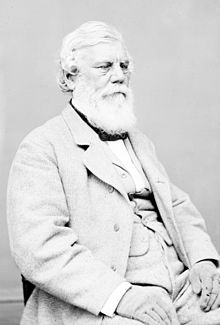William Aiken Jr.
William Aiken, Jr. | |
|---|---|
 | |
| 61st Governor of South Carolina | |
| In office December 7, 1844 – December 8, 1846 | |
| Lieutenant | J. F. Ervin |
| Preceded by | James Henry Hammond |
| Succeeded by | David Johnson |
| Member of the U.S. House of Representatives from South Carolina's 2nd district | |
| In office March 4, 1853 – March 3, 1857 | |
| Preceded by | James L. Orr |
| Succeeded by | William P. Miles |
| Member of the U.S. House of Representatives from South Carolina's 6th district | |
| In office March 4, 1851 – March 3, 1853 | |
| Preceded by | Isaac E. Holmes |
| Succeeded by | William W. Boyce |
| Member of the South Carolina Senate from St. Philip's and St. Michael's Parish | |
| In office November 28, 1842 – December 7, 1844 | |
| Member of the South Carolina House of Representatives from St. Philip's and St. Michael's Parish | |
| In office November 26, 1838 – November 28, 1842 | |
| Personal details | |
| Born | January 28, 1806 Charleston, South Carolina |
| Died | September 6, 1887 (aged 81) Flat Rock, North Carolina |
| Resting place | Magnolia Cemetery, Charleston, South Carolina |
| Political party | Democratic |
| Spouse | Harriet Lowndes Aiken |
| Profession | businessman, planter |
William Aiken, Jr. (January 28, 1806 – September 6, 1887) was the 61st governor of South Carolina, serving from 1844 to 1846. He also served in the state legislature and the U. S. Congress, running unsuccessfully for Speaker of the House in 1856 in “the longest and most contentious Speaker election in House history.”
Early life
Aiken was the child of William Aiken, the first president of the pioneering South Carolina Canal and Rail Road Company. Unfortunately, William Sr. was killed in a Charleston carriage accident and never saw his namesake town of Aiken, South Carolina. Aiken graduated from the College of South Carolina (now the University of South Carolina) at Columbia in 1825 and engaged in agriculture as a planter, entering politics in 1837. He was a member of the State House of Representatives 1838-1842, and served in the State Senate 1842-1844.[1] His term as governor ran from 1844 to 1846.
Congressional service
Subsequent to his service as governor, Aiken served in the U. S. House of Representatives for the Thirty-second, Thirty-third, and Thirty-fourth Congresses (March 4, 1851 – March 3, 1857). In December, 1855, Aiken was a leading candidate for Speaker of the House of Representatives. After two months and 133 ballots, Aiken lost the race to Nathaniel P. Banks by a vote of 103 to 100, in what has been termed the “the longest and most contentious Speaker election in House history”.[2]
Personal life
Aiken was married to Harriet Lowndes Aiken. He was a successful businessman and planter and lived in Charleston, South Carolina. Aiken's first cousin, D. Wyatt Aiken served as a Confederate States Army officer and five-term U.S. Congressman. Aiken died at Flat Rock, NC, September 6, 1887, and was interred in Magnolia Cemetery, Charleston, S.C. His house, the Aiken-Rhett House, is part of the Historic Charleston foundation.
References
- ^ "Biographical Directory of the United States Congress". U. S. House of Representatives, Office of the Historian.
- ^ "Historical Highlights, February 02, 1856". U. S. House of Representatives, Office of the Historian. Retrieved September 11, 2013.
External links
- United States Congress. "William Aiken Jr. (id: A000063)". Biographical Directory of the United States Congress.
- 1806 births
- 1887 deaths
- People from Charleston, South Carolina
- University of South Carolina alumni
- Members of the South Carolina House of Representatives
- South Carolina State Senators
- Governors of South Carolina
- University of South Carolina trustees
- Members of the United States House of Representatives from South Carolina
- South Carolina Democrats
- Democratic Party members of the United States House of Representatives
- Democratic Party state governors of the United States
- 19th-century American politicians

